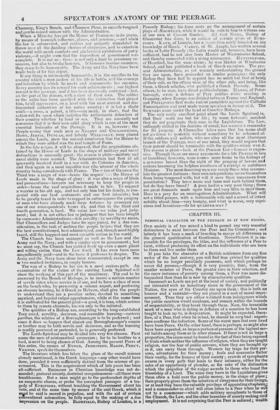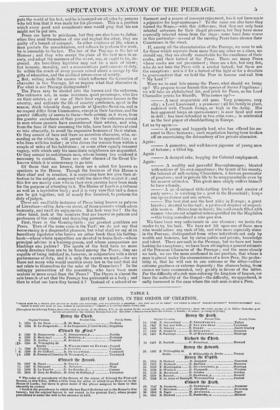CHAPTER III.
PERSONAL CHARACTER OF THE PEERAGE AS IT NOW EXISTS.
OUR society is of too mixed a kind to permit any very essential distinctions to exist between the Peer and the Commoner; and latterly it has been a mark of breeding to merge all differences in the general qualification of Gentleman. Nevertheless it is im- possible for the privileges, the titles, and the influence of a Peer to exist, without producing its effect on the individuals who are born to them and live under them.
If you take the character of a British nobleman from any fine writer of the last century, you will find him praised for qualities which he no longer peculiarly possesses, and which perhaps he never did possess,—though it is very possible, Abet, from the smaller number of Peers, the greater care in their selection, and the rarer instances of poverty among them, a Peer was more dis- tinguished then than he is now by characteristic qualities.
Inasmuch as Lords are put at the head of society, and politically are intrusted with an hereditary share in the government of the Nation, the eyes of the Country are upon them : this is both an honour and a restraint—they are placed in a sort of moral impri- sonment. Thus they are either withheld from indulgences which the public sanction would condemn, and remain within the bounds of respectability, or they break through them. Now, the invariable mark of a man who is acting in defiance of a sanction he has been taught to look up to, is desperation. It might be expected, there- fore, of a Peer, that when he is bad, he should be very bad: experi- ence confirms the induction. Some of the worst men that ever lived have been Peers. On the other hand, there is perhaps, as might also have been expected, as large a portion of persons of the highest mo- ral habits among them as in other classes. If there is not so large a proportion, the cause must be found in the fact of their being exposed to trials which neither the influence of religion, when they are taught religion, nor the fear of public censure, when they are brought up in it, can carry them through. Women lay traps for their per- sons, adventurers for their money ; fools and coxcombs flatter their vanity, for the honour of their society ; crowds of sycophants swarm in every path that leads to their intimacy, either for the sake of an opportunity of plunder, or for sake of the distinction which the prejudice of the vulgar awards to those who boast the friendship of a Lord. The voice they have in the Legislature gives them often a hold over the public money, in the shape of place; their propertygives them the selection of clergymen for their livings, or at least they have the valuable privilege of appointing chaplain;; and a commander-in-chief will often listen to a Peer when he will not to a commoner—which adds military sycophants to those of the Church, the Law, and the other branches of society seeking civil employment. It is not surprising that the Peer is seduced; wealth
puts the world at his feet, and he is besieged on all sides by persons who tell him that it was made for his pleasure. This is a position which every good and considerate man would pray that his son might not be put into. Peers are born to privileges, but they are also born to duties: when they avail themselves of one and neglect the other, they are guilty of a breach of compact. In other relations of life, where a man pockets the consideration, and refuses to perform the work, he is amenable to the law. The law of the Peerage is the law of Honour ; and they who accept the place of the best men in so- ciety, and adopt the manners of the worst, are, or ought to be, dis- graced. An hereditary legislator may not be a man of talent ; but honesty, morality, and a conscientious performance of duty, lie within the reach of every person raised above a savage by the gifts of education, and the civilized intercourse of society.
ea- But, setting aside the causes which influence the formation of character in the Peerage, let us inquire what that character is. For what is our Peerage distinguished ?
The Peers may be divided into, the known and the unknown. The unknown are, in some instances, quiet personages, who live on their estates, or at one of their least expensive houses in the country, and cultivate the life of country gentlemen, sport in the season, drink tolerably deep, preside at Quarter-Sessions, and in no respect differ from Commoners, except in their hauteur, and the greater difficulty of access to them-both arising, as it were, from the greater sacredness of their persons. Or the unknown consist in men whose parents have encumbered their estates, and who, from the time of their assuming the title, have been driven abroad or into obscurity, to avoid the expensive honours of their station. Or they consist of here and there an eccentric character, who, ac- cording as the whim is, will permit no one to approach him ; or who lives with his butler ; or who drives the women from within a couple of miles of his habitation ; or some other equally innocent vagary, with which only his immediate neighbours are acquainted. Or they consist in unfortunate men, whom lunacy has rendered it necessary to confine. There are other classes of the Great Un- known which it is unnecessary to go into. Of those that are known, there are a select few known as speakers in the House. Though the business of this House is their chief end in creation, it is surprising how few give their at- tention to the subject, compared with the mass that neglect it ; and this few are mostly men who in their own persons have been made for the purpose of attending to it. The House of Lords is a tribunal as well as a legislative body ; and it is very rare that half a dozen can be got together, out of nearly five hundred, to perform the duty of judges. There are creditable instances of Peers being known as patrons of Literature-of the Arts-in short, of those pursuits which adorn humanity, and exalt its enjoyments. But how very few ! On the other hand, look at the numbers that are known as patrons and professors of the animal and degrading pursuits.
First, there is the Gaming-table: our greatest gamblers are Peers. Then of the same class is the Turf: we do not say that horse-racing is a disgraceful pleasure, but what shall we say of an hereditary legislator who knows no other book than his betting- book-whose whole sympathies are devoted to horse flesh-whose principal adviser is a training-groom, and whose companions are blacklegs and jockies ? The sports of the field have no more steady devotees than are to be found among the Peers ; they are capable of being indulged in, however, in conjunction with a strict performance of duty, and it is only the excess we mark,-for are there not many who would sacrifice every law in the land that did not relate to themselves for the sake of the Game-laws ? In the unhappy persecution of the peasantry, who have been more zealous or more cruel than the Peers ? The Opera is almost the sole branch of art that the Peerage has patronized as a body ; and then to what use have they turned it ? Instead of a school of re- finement and a source of innocent enjoyment, has it not been made a pbpiniere for kept-mistresses ? To the same use also have they turned the Stage,-with this difference, that they not only have selected actresses for their illegal pleasures, but they have more especially selected wives from the stage: some have done worse in this particular-several of the existing Peers have chosen their Countesses in the street.
If, among all the characteristics of the Peerage, we were to ask for those which separate them more than any other as a class, we should say, they are chiefly remarkable for the excellence of their cooks, and their hatred of the Press. There are many Peers whose cooks are not pre-eminent ; there are a few, but very few, who do not hate the Press with a cordial hatred; but these are the exceptions : and is it for a hatred of the light or for a devotion to g,ourmanderie that we hold the Peer in honour and call him " My Lord ?"
Were we to cast lots among the Peers, what should we bring up ? We propose to our friends this species of Sortes Virgiliance : we will take an alphabetical list, and prick for Peers, as the Lord Chancellor pricks for Sheriffs. Who comes up ?- --- A most respectable old man. Very pompous, very silly ; a Lord Lieutenant ; a pensioner ; all his family in place, endowed with Church livings, or high in the Artily. His heir-apparent keeps an opera-dancer ; is over head and ears in debt ; has been defendant in two crim. cons.; is celebrated as the best player of chuckfarthing in Europe.
Let us try again:- A young and beggarly lord, who has offered his co- ronet to three heiresses ; each negotiation having been broken off on ascertaining the debauchery of his private character.
Again : A gamester, and well-known pigeoner of young men of fortune ; a titled leg.
Again : - A decayed rake, begging for Colonial employment. Again : A wealthy and powerful Boroughmonger; bloated with notions of his own importance; the tyrant of his county, the beloved of self-seeking Churchmen, a furious prosecutor of poachers ; said in private life to be unapproachable even by his nearest intimates. This great man simply suffers himself to have a fiimily. A gcod-natured tittle-tattling fetcher and carrier of party news ; is watching for a post in the Household ; keeps one opera-dancer and one actress.
The best shot and the best rider in Europe ; a great breeder ; devoted to the turf; a professed despiser of respect- able women. Drives four-in-hand ; his mail-coach filled with women et ho are not admitted unless qualified for the Mag-daleik -this being considered a sine qua non.
We have been very unfottunate in our chances : we invite the reader to try his luck. We have not hit upon one of those men who would adorn any rank of life, and who more especially shine in the Peerage, distinguished from other individuals not only by wealth and honours, but by virtue public and private, knowledge and talent. There are such in the Peerage, but we have not been looking for exceptions ; we have been attempting a general estimate of the Personal Character of the Peerage ; and the more closely we look, we are the more confirmed in our position, that where a man is placed under the circumstances of a born Peer, the proba-. bility is, that he will run to one extreme or the other-either extreme goodness or extreme depravity ; the chances being, from causes we have enumerated, very greatly in favour of the latter. For the difficulty of a rich man entering the kingdom of heaven, we have the authority of the Gospel-the difficulty, we apprehend, is sadly increased in the case where the rich man is also a Peer.



















































 Previous page
Previous page